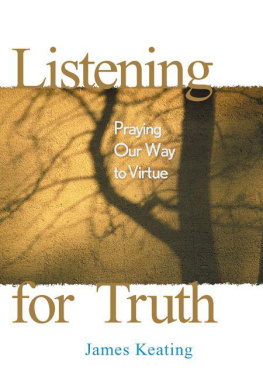James Keating - Listening for Truth: Praying Our Way to Virtue
Here you can read online James Keating - Listening for Truth: Praying Our Way to Virtue full text of the book (entire story) in english for free. Download pdf and epub, get meaning, cover and reviews about this ebook. year: 2002, publisher: Liguori Publications, genre: Religion. Description of the work, (preface) as well as reviews are available. Best literature library LitArk.com created for fans of good reading and offers a wide selection of genres:
Romance novel
Science fiction
Adventure
Detective
Science
History
Home and family
Prose
Art
Politics
Computer
Non-fiction
Religion
Business
Children
Humor
Choose a favorite category and find really read worthwhile books. Enjoy immersion in the world of imagination, feel the emotions of the characters or learn something new for yourself, make an fascinating discovery.
- Book:Listening for Truth: Praying Our Way to Virtue
- Author:
- Publisher:Liguori Publications
- Genre:
- Year:2002
- Rating:5 / 5
- Favourites:Add to favourites
- Your mark:
- 100
- 1
- 2
- 3
- 4
- 5
Listening for Truth: Praying Our Way to Virtue: summary, description and annotation
We offer to read an annotation, description, summary or preface (depends on what the author of the book "Listening for Truth: Praying Our Way to Virtue" wrote himself). If you haven't found the necessary information about the book — write in the comments, we will try to find it.
Paperback
Listening for Truth: Praying Our Way to Virtue — read online for free the complete book (whole text) full work
Below is the text of the book, divided by pages. System saving the place of the last page read, allows you to conveniently read the book "Listening for Truth: Praying Our Way to Virtue" online for free, without having to search again every time where you left off. Put a bookmark, and you can go to the page where you finished reading at any time.
Font size:
Interval:
Bookmark:
Listening
for Truth
Praying Our Way
to Virtue
James Keating

Imprimi Potest:
Richard Thibodeau, C.Ss.R.
Provincial, Denver Province
The Redemptorists
ISBN 0-7648-0816-8
Library of Congress Catalog Number: 2001092240
2002, James Keating
Printed in the United States of America
02 03 04 05 06 5 4 3 2 1
All rights reserved. No part of this book may be reproduced or transmitted in any form or by any means, electronic, or mechanical, including photocopying, recording, or by any information storage and retrieval system without permission in writing from the author.
Scripture quotations are from the New Revised Standard Version of the Bible, copyright 1989 by the Division of Christian Education of the National Council of Churches of Christ in the USA. Used with permission. All rights reserved.
To order, call 1-800-325-9521
www.liguori.org
www.catholicbooksonline.com
To Ina Mairead, a blessing beyond all telling,
and to all women who faithfully work
the fields of Christian motherhood, praying
and hoping for a harvest of saints
in their children, especially Kris Gehring,
Rita McCabe, Toni Mitchell,
and, of course, Marianne.
CHAPTER ONE
Prayer, A Basic Christian Need
CHAPTER TWO
Rediscovering the Soul Through Prayer
CHAPTER THREE
Conscience: Listening for Truth from the Mouth of Truth
CHAPTER FOUR
Conscience: Forming a Mind Eager to Know Moral Truth
CHAPTER FIVE
Practical Ways of Living a Life of Virtue Prayer
P rayer, whether offered as an individual or as a community in a liturgical setting, is the seeking of communion with God. The moral life also seeks communion, but its first purpose is to facilitate communion with what is morally good, not with what is ultimately good, namely, God. But the two are not opposed in any way. In fact, the more one grows in moral goodness the more one seeks completion in what is ultimate. Being good, in other words, is not its own reward; the virtuous may come to a certain sense of peace in their dispositions and behavior, but their hearts are still restless until they rest in God (Saint Augustine).
We are made for more than virtue, but we cannot enjoy that morewhich has been identified by faith as communion with Godwithout first attaining moral goodness. If we were to come to God first, without seeking moral goodness, God would lead us to virtue. Coming to God through a religious conversion is simply the implicit beginning of a moral conversion, just as coming to moral conversion is the beginning of communing with the ultimate source of all virtue: God. Thus, prayer (discovering and communing with God) and virtue (being faithful to the meaning of what is morally good) complete and define one another. Their joining together explicitly in every Christian life and community is the way to enter the struggle of taking on virtue even as one accepts the gifts to put on the Lord Jesus Christ (Romans 13:14). In other words, living in prayer and virtue places us at the very core of discipleship.
There are thousands of descriptions of prayer in thousands, maybe millions, of books and essays. What characterizes my approach in this book, however, is that I am going to describe prayer from a perspective of growing in moral virtue. Of course, prayer cannot be manipulated for our ends, but like communication with ones spouse, it can serve the purpose of deepening communion with your beloved regardless of the specific topic at hand. It is the communication itself that serves to deepen intimacy, not the content of the message. One can grow in communion with a spouse even while speaking about mundane domestic issues as long as the spouse is attended to in love and respect. Similarly, if we converse with God in faith and hope and love about any topic, we will grow in intimacy with God. Certainly, we are concerned with our growth in moral goodness; our very success as a human person is at stake in becoming good. God is equally concerned with that topic for our sake, and so we can approach God and converse about our need for moral conversion.
__________
C hristian moral living appears at once lofty and yet ordinary. Many Christians report how frustrated they are with their perceived lack of growth in virtue. The moral life seems unattainable. It is mentioned by some that they carry their struggle with pride for decades, or the burdens of lust or greed have weighed them down year after year. For others, envy gnaws away at their inner peace and refuses to yield to the development of steady and pacific virtues. Yet, in spite of personal failure and struggle, many of us do not give up on moral growth and yield to cynicism. We want to believe we can reach a place in life where temptation is muted, even if not eradicated; a place where we make decisions out of the hope and knowledge of being persons who possesses a dignity from God. Do we ever reach a place of such rest and strength?
The answer to that is, as to most things human, yes and no. We can reach a place where, for the most part, our decisions are the fruit of dispositions yielded over to God in faith, hope, and love. But there will be a remainder factor. This factor is the struggle to be good; the work of remembering our dignity and living accordingly; the task of being focused upon fidelity when many around us, and voices within us, tempt us to go lower rather than higher. I am using the words struggle, work, and task not to reduce moral living to simply an exercise in will power, but rather to contextualize it in our real life-graced efforts to do the right thing.
Simply saying that moral living is a grace, or to encourage the struggling ones to lighten up in their quest for virtue, may in fact be just that: too simple. We recognize that emotional and mental pathologies and various neurotic tendencies can heighten the anxiety or impossibility of such persons achieving moral peace. Of course, noting this does not end the reality of struggle for those who are balanced, sane, and integrated. The most fruitless choice is to try to end the struggle by giving in to the temptation. Trying to end the struggle by giving in to the unrelenting gnawing of envy, for example, certainly takes some pressure off, but only in the way abuse of alcohol relieves the pressure to escape a truth too real to bear: It masks an unpleasant reality, it doesnt remove it. Giving in to a vice merely quiets the voice of temptation long enough for one to engage in the object of such temptation. After the morbid delight is satisfied, we find that the voice of temptation has not gone away satisfied and full. Rather, the tempting vice takes up residence in us, and it will not leave if we continue to yield to its voice; in fact, just the opposite, it comes to possess us. To arrive at such a state is the true origin of personal horror. Becoming morally good does involve a strugglein due proportion, a struggle that hopes to break the bonds to vice we have built up over the years.
Therefore, since we are surrounded by so great a cloud of witnesses, let us also lay aside every weight and the sin that clings so closely, and let us run with perseverance the race that is set before us, looking to Jesus the pioneer and perfecter of our faith, who for the sake of the joy that was set before him endured the cross, disregarding its shame, and has taken his seat at the right hand of the throne of God. Consider him who endured such hostility against himself from sinners, so that you may not grow weary or lose heart. In your struggle against sin you have not yet resisted to the point of shedding your blood.
Next pageFont size:
Interval:
Bookmark:
Similar books «Listening for Truth: Praying Our Way to Virtue»
Look at similar books to Listening for Truth: Praying Our Way to Virtue. We have selected literature similar in name and meaning in the hope of providing readers with more options to find new, interesting, not yet read works.
Discussion, reviews of the book Listening for Truth: Praying Our Way to Virtue and just readers' own opinions. Leave your comments, write what you think about the work, its meaning or the main characters. Specify what exactly you liked and what you didn't like, and why you think so.











